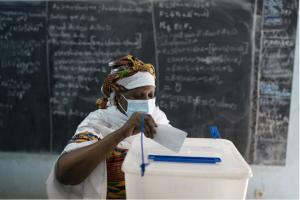By: Hannah Bennink
Impunity Watch Staff Writer
ABIDJAN, Ivory Coast – Citizens in the Ivory Coast began casting their votes on Saturday, October 31st, 2020, in what has been an extremely controversial presidential election. The polls closed at 18:00 local time (GMT) and the votes are currently being counted; however, early estimates show a likely win for the incumbent.

Running in the election is: President Alassane Ouattara, age 78, of the Rally of Houphouëtists for Democracy and Peace; Henri Konan Bédié, age 86, of the Democratic Party of Ivory Coast; Pascal Affi N’Guessan, age 67, of the Ivorian Popular Front faction; and Kouadio Konan Bertin, age 51, as an independent candidate.
Protests broke out in August when, in response to the death of his preferred successor, President Ouattara said he would run for a third term despite it violating the country’s constitution’s two-term presidential limit. The President justified his running for a third term because of a 2016 constitutional referendum, which he claimed, “reset the clock” and invalidated his first term. His opponents disagreed, however, saying a third term for the president would be illegal.
The protests in response to the election began in August and have resulted in at least 30 deaths. There were at least 12 more deaths from election day clashes. Opposition parties had called for civil disobedience, mass protests, and an overall boycott of the presidential vote in an effort to “block a dictatorship.” Opposition activists blocked roads and burned election materials, shutting down an estimated 23 percent of polling stations. The protestors closest to the neighborhood where President Ouattara cast his ballot were cleared with tear gas.
There have been long-standing tensions in the Ivory Coast between several of the country’s leading politicians, but most the most recent conflict occurred in 2010 when Laurent Gbagbo, the president at the time, refused to concede to now President Ouattara. A violent civil war followed and resulted in more than 3,000 deaths in five months of violence. Gbagbo was acquitted of crimes against humanity at the International Criminal Court, however many believe that anger over Ouattara’s seeking a third election may end in another massive violent conflict.
The International Criminal Court voiced its concern about the escalation of violence in the Ivory Coast as the election grew near, specifically the allegations of intercommunal violence and the destruction of civilian-owned property. The Court noted that its investigations on the Ivory Coast, opened in October 2011, remain ongoing and that the violence seen in 2010 must not be repeated by any side.
On November 2nd, in response to what seems to be an overwhelming win for President Ouattara, opposition leaders announced that they will not recognize the President’s victory. The leaders also stated that they have formed a national transition council and that an interim government would be named to prepare for a new election.
For further information, please see:
BBC NEWS – Ivory Coast elections: Voters go to the polls amid opposition boycott – 31 Oct. 2020
AP News – Ivory Coast Opposition asserts 12 dead in election violence – 31 Oct. 2020
AP News – Ivory Coast tensions rise as president seeks 3rd term – 30 Oct. 2020
Thomson Reuters – Ivory Coast’s Ouattara takes early lead in election – 1 Nov. 2020
Al Jazeera – Ouattara’s election victory could risk Ivory Coast’s stability – 2 Nov. 2020